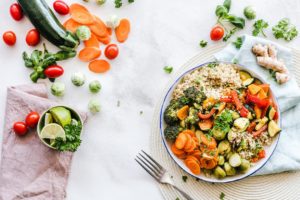
Do you ever wonder why the supposedly healthy and widely recommended food you’ve been eating is not helping you feel your best? The key could involve what Chinese medicine refers to as the energetic quality of a particular food. In TCM, those qualities are based on different properties of the food, including color, taste and preparation.
During winter, it’s important to be aware of these different energetic qualities to help yourself stay healthy and in balance with the natural world. These tips can apply to any season, but since so many of us tend to get sick in wintertime, it’s especially important this time of year.
According to Chinese medicine, the body has two components: yin and yang, which are like water and fire. These two elements are constantly trying to achieve balance so you can feel your best, and while most of us are a mixture of the two, at times one quality can dominate. Yin refers to a colder nature: more pale, feeling cold, having lower energy, loose stools, feeling more introverted and having clear and white fluids. Yang, on the other hand, is hotter in nature and includes a more outgoing personality, dry mouth, thirst, craving cold drinks, perhaps being prone to constipation, producing darker urine, having yellow sputum and feeling easily angered. Many people are a mixture of the two, so a proper diagnosis from a licensed acupuncturist is a first step toward a proper diet fit for your constitution.
The organs of the body are also considered yin or yang. The heart, spleen, lungs, liver and kidneys are yin, solid, with substance, while the small intestines, gall bladder, stomach and urinary bladder are yang and involved with movement and transport. Eating the wrong foods for your particular nature might interfere with the body’s balance and exacerbate problems even if the food is nutritious biochemically. Just as some foods might disrupt you internally, each of these properties is also connected to the external, natural world, and balancing that out with each season is an important part of healthy eating in TCM. Here are three examples of food qualities.
Cold: Cold foods would include fruits and vegetables that grow in the summertime. It also would include cold foods that are refrigerated, iced or frozen. If you want to include more fruits and vegetables, it is advisable to eat them at room temperature or cook vegetables lightly to make them easier to digest. Examples of cold foods are watermelon, apples, bananas, fruit juices, kelp, cabbage, tofu, eggs, yogurt and cucumber. Eating these foods will reduce heat signs in those with excess yang energy. If you are already cold, or it is wintertime, these foods might interfere with the digestive fire of the stomach, and you would not absorb the nutrients well. In addition, if you have a cold condition, such as chronic arthritis of a cold nature, or premenstrual cramping due to cold, it might make you feel worse and more achy.
Warm: Foods that are considered warming speed up the metabolism and include ginger, cinnamon, cherries, garlic, onion, lamb, chicken, hot peppers, and quinoa. If you’re running hot, you might want to eat these sparingly and include cooler foods. For example, if you have a hot condition and are in pain due to inflammation, you would not want to eat hot and spicy foods. On the other hand, if you’re not already inflamed, these are great foods to reach for during the colder winter months.
Damp: When the digestive system is not transforming and transporting food and fluids well, you get what is termed in Chinese medicine as “dampness” or phlegm build up, which is an increase of mucus. This can leave you feeling sluggish, foggy, congested, bloated and heavy. In such a case, a combination such as a banana and yogurt, which is highly nutritious, might not be right for you, as those foods promote dampness. Foods that increase dampness include dairy, greasy, fatty, fried foods, some antibiotics and alcohol. Examples of foods that help this condition are barley, basmati rice, alfalfa sprouts, lemons, green tea, walnuts, and mushrooms.
In addition to those mentioned above, there are food tastes such as sour, sweet, pungent, salty and bland, which affect different organs of the body as well as the absorption and distribution of food. Food is medicine. Ask me today if you want to know more about your own personal constitution.



